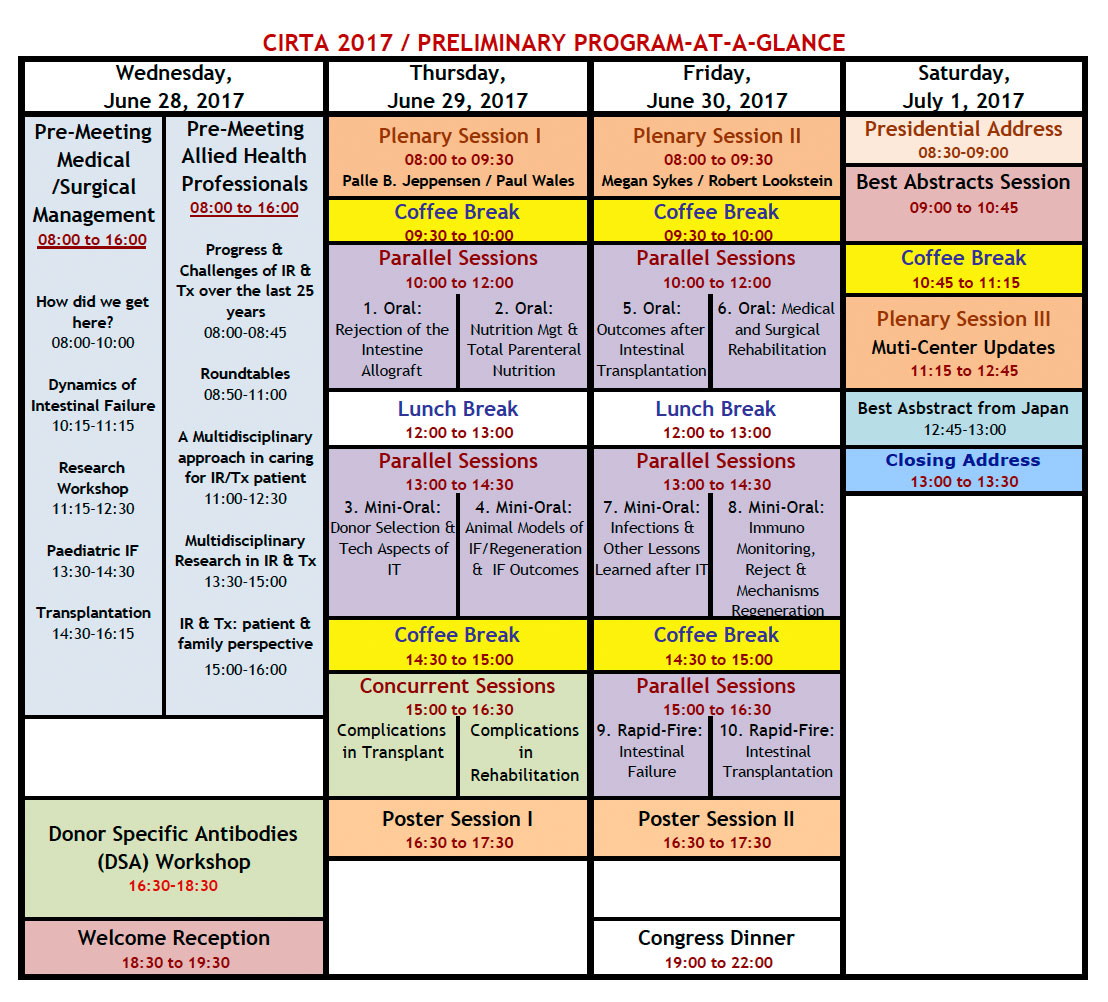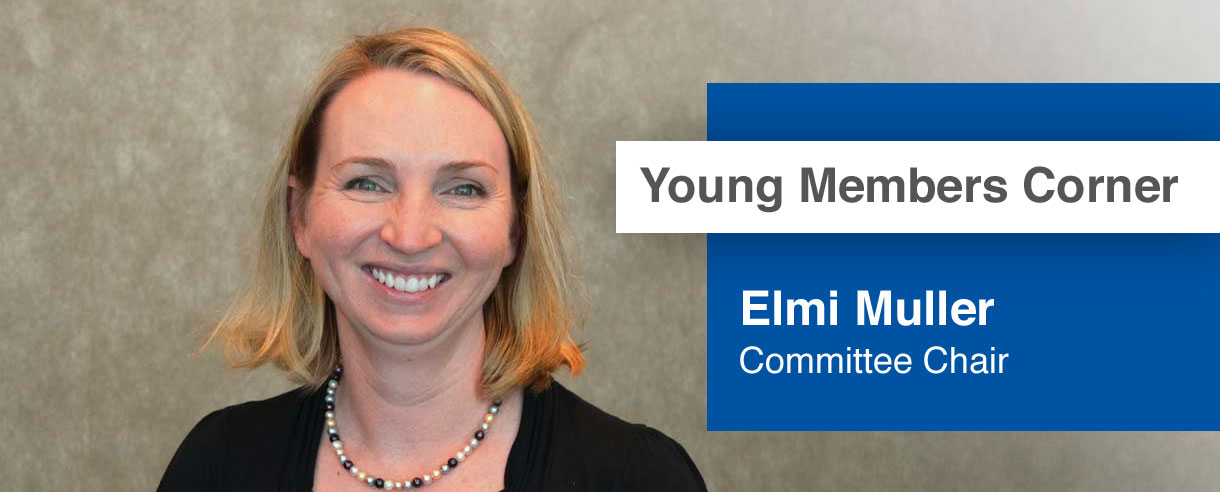

We would like to bring you up-to-speed with the state with the field of Intestinal Rehabilitation and Transplantation ahead of the XV International Congress of Intestinal Rehabilitation & Transplant Association co- organized by Mount Sinai and Columbia University will be held at the Roosevelt Hotel in New York City from June 28th to July 1st 2017. Health care professionals will meet to discuss the latest development in the care of patient with intestinal failure (IF) and intestinal transplantation.
Intestinal rehabilitation:
The prognosis of patient with IF has improved through the development of new medical and surgical therapies and the introduction of multidisciplinary intestinal rehabilitation programs. Optimization of parenteral nutrition (PN) support and prevention of intestinal failure associated liver disease (IFAL) have decreased the need for intestinal transplantation during the past decade. The etiology of IFALD is multifactorial, studies suggest involvement of ω 6 fatty acids, multiple surgeries, lack of enteral of stimulation and more recently intestinal microbiome.
Korpela K, et al 1 compared the intestinal microbiota of patients with IF with healthy controls and its association with liver steatosis. They demonstrated that patients with IF have a simpler and less diverse flora when compared with healthy control. This microbiota changes is associated with liver steatosis. They proposed that overgrowth of Proteobacteria during PN results from the lack of competition, which likely enable an increase in the abundance of opportunistic and invasive species, including the members of Proteobacteria. Furthermore, Proteobacteria altered bile acid signaling which prevent the activation of nuclear farnesoid X receptor (FXR). FXR regulates the expression of the major transporter proteins for bile acids and bile acid hemostasis. Interestingly, sepsis and phytosterols present in soybeans based lipid emulsions have been shown to down-regulate FXR receptors.
All these observations have promoted the development of new therapeutic armamentarium including: a) newer lipid emulsions for the management and prevention of IFALD (Omegaven, SMOFLipid), b) prevention or whether it be better understanding of lipid restriction strategies, greater application of intestinal lengthening operations such as STEP and LILT operations and the recent approval of Teduglutide (GLP-2 analog for adult patients with short bowel), outcomes of intestinal rehabilitation appear to be improving.
CIRTA 2017 - Due to this issue of the Tribune Pulse
Early Bird Registration Deadline has been extended to April 10, 2017
Intestinal transplantation:
Intestinal transplantation (IT) has shown exceptional growth and improvement in graft survival rates over the past two decades. Improvement in surgical techniques and better understanding of immunosupressive therapies are linked to this progress. Patient survival at 1-year post transplantation is 76%, but long-term allograft failure due to rejection remains a major problem.
The presence of donor-specific antibodies (DSA) has been associated with rejection and allograft loss in solid-organs transplantation2-5. Clinical reports suggest an association between the presence of HLA antibodies, circulating DSA and allograft rejection episodes in IT recipeints6-8. Preformed and de novo DSA may act synergistically with cell-mediated mechanisms, inducing a negative immunological effect and promoting the progression to chronic rejection and graft failure7. Cheng et al, has reported that 1 in 4 patients will develop de novo DSA following IT, and 30% could lose the graft within 2-years8. Zuber et al, have reported that gut-resident T cell subsets are replaced faster in rejecting intestinal allografts of patient with mixed rejection9. These observations highlight the need for better monitoring DSA role on intestinal graft rejections and advance the understanding of the immune mechanisms contributing to allograft loss.
Clinical observations demonstrated that patients receiving composite graft have a reduce rate of rejection episodes. The amount of lymphoid mass replacement has been linked to the immunogenicity of the graft. Multivisceral transplant (MVTx) involves the most extensive recipient lymphoid mass removal (entire foregut, recipient spleen, liver and intestine) and transplantation of the greatest donor lymphoid mass, when compare with IT.
Zuber et al, observed that MVTx was associated with higher levels of and more prolonged multilineage chimerism in the recipients’ peripheral circulation than IT10 . Furthermore, only liver containing graft or MVTx recipients demonstrated myeloid chimerism10. While these results may suggest that the progenitor cells responsible for long-term lymphoid and myeloid chimerism originate from the liver graft, the addition of an IT to an LTx markedly enhanced chimerism of all of these lineages10, despite the minimal chimerism in recipients of IT alone. Furthermore, the investigators used polychromatic flow cytometry and high-throughput T cell receptor sequencing of serial intestinal biopsies to show that gut-resident T cell turnover in human intestinal allografts are correlated with the balance between intragraft host-versus-graft (HvG) and graft-versus-host (GvH) reactivities and with clinical outcomes. They demonstrated that HvG -reactive clones accumulated in intestinal allografts at the time of rejection and persisted long after resolution, despite clonal contraction. These HvG -reactive tissue-resident memory T cells (TRM) may be reactivated later to cause rejection. In the absence of overwhelming cellular and antibody-mediated HvG reactivity, preexisting donor TRM with GvH reactivity may expand in the graft and prevent the replacement of donor cells by recipient T cells. Our study suggests that resident TRM can mount an immune response that counteracts rejection. Therapeutic approaches that prevent the entry of HvG-reactive T cells and hence their establishment as TRM could potentially have a major impact on outcomes of IT recipients.
In summary we will cover the most exciting discoveries and innovation in the field of intestinal rehabilitation and transplantation
Please submit feedback on how INtestinal Rehabilitation and transplantation applies to your practice
Related News
Scientists tissue engineer human intestines and functioning nerves
Cincinnati - Scientists report in Nature Medicine using human pluripotent stem cells to grow human intestinal tissues that have functioning nerves in a laboratory, and then using these to recreate and study Hirschsprung's disease. https://www.eurekalert.org/pub_releases/2016-11/cchm-ste111616.php
CIRTA 2017 Program Highlights
June 28 Workshops
- New! DSA Workshop: Antibody Mediated Rejection and Significance of Donor Specific Antibody in Intestine Transplantation
- Allied Health Professionals (08:00 - 16:15)
- Sessions include: Progress and Challenges of Intestinal Rehabilitation and Transplant Over the Last 25 Year; Roundtable Session; A Multidisciplinary Approach in Caring for the Intestinal Rehab/Transplant Patient: Case Study; A Multidisciplinary Approach in Caring for the Intestinal ; Rehab/Transplant Patient: Case Study; Intestinal Rehab and Transplant from the Patient and Family Perspective
- Surgical and Medical Management (08:00 - 16:15)
Plenary Lectures
 |
Neuro-Endocrine Signaling in Patients with Short Bowel Syndrome Palle B Jeppesen, Denmark |
 |
Multi-Disciplinary Management of Paediatric Intestinal Failure Paul W Wales, Canada |
 |
The Expanding Role of the Interventionist Robert Lookstein, United States |
 |
Immunology of Intestinal Transplant Megan Sykes, United States |
Visit the Congress website www.cirta2017.org for full details and a list of all speakers
CIRTA 2017 Program Grid 
References
- Korpela K, Mutanen A, Salonen A, Savilahti E, de Vos WM, Pakarinen MP. Intestinal Microbiota Signatures Associated With Histological Liver Steatosis in Pediatric-Onset Intestinal Failure. JPEN J Parenter Enteral Nutr. 2017;41(2):238-248.
- Kaczmarek I, Deutsch MA, Kauke T, et al. Donor-specific HLA alloantibodies: long-term impact on cardiac allograft vasculopathy and mortality after heart transplant. Exp Clin Transplant. 2008;6(3):229-235.
- Mohan S, Palanisamy A, Tsapepas D, et al. Donor-specific antibodies adversely affect kidney allograft outcomes. J Am Soc Nephrol. 2012;23(12):2061-2071.
- Morrell MR, Pilewski JM, Gries CJ, et al. De novo donor-specific HLA antibodies are associated with early and high-grade bronchiolitis obliterans syndrome and death after lung transplantation. J Heart Lung Transplant. 2014;33(12):1288-1294.
- O'Leary JG, Demetris AJ, Friedman LS, et al. The role of donor-specific HLA alloantibodies in liver transplantation. Am J Transplant. 2014;14(4):779-787.
- Farmer DG, Venick RS, Colangelo J, et al. Pretransplant predictors of survival after intestinal transplantation: analysis of a single-center experience of more than 100 transplants. Transplantation. 2010;90(12):1574-1580.
- Tsai HL, Island ER, Chang JW, et al. Association between donor-specific antibodies and acute rejection and resolution in small bowel and multivisceral transplantation. Transplantation. 2011;92(6):709-715.
- Cheng EY, Everly MJ, Kaneku H, et al. Prevalence and clinical impact of donor-specific alloantibody among intestinal transplant recipients. Transplantation. 2016.
- Zuber J SB, Lau SP, Obradovic A, Fu J, Yang S, Lambert M, Coley S, Weiner J, Thome J, , DeWolf S FD, Shen, Y, Caillat-Zucman S, Bhagat G, Griesemer A, Martinez M, Kato T, Sykes M. Bidirectional intragraft alloreactivity drives the repopulation of human intestinal allografts and correlates with clinical outcome. Science Immunology. 2016;1(eaah3732):1-10
- Zuber J, Rosen S, Shonts B, et al. Macrochimerism in Intestinal Transplantation: Association With Lower Rejection Rates and Multivisceral Transplants, Without GVHD. American journal of transplantation : official journal of the American Society of Transplantation and the American Society of Transplant Surgeons. 2015;15(10):2691-2703.
About our guest editor
Mercedes Martinez, MD
Associate Professor of Pediatrics at CUMC
Columbia University College of Physicians and Surgeons
Director, Intestinal Transplant Program
Clinical Director, Human Studies Core CCTI
Associate Program Director, Liver Transplant Hepatolgy Fellowship
Morgan Stanley Children Hospital of New York
Mercedes Martinez, MD, is an Associate Professor of Pediatrics and the Medical Director for the Intestinal Transplant Program at the Center for Liver Disease and Abdominal Organ Transplantation. She provides state-of-the-art care for children with a multitude of liver and intestinal issues, including children with liver and intestinal failure that require transplantation, children with intestinal failure, and for those with intestinal failure associated liver disease. Her research interests include liver tumors in children, autoimmune liver diseases, metabolic disorders, nutritional deficiencies associated with liver diseases, and intestinal failure.
Upcoming Meeting Deadlines
IXA 2017 - APRIL 7
ABSTRACT SUBMISSION DEADLINE
INTERNATIONAL XENOTRANSPLANTATION ASSOCIATION (WWW.IXA2017.ORG) - SEPTEMBER 20-23 - BALTIMORE, MD, USA
IMPORTANT - IXA and TTS are offering up to 10 scientific awards for trainees, allied health professionals, and residents from emerging economy nations.
ISODP 2017 - APRIL 21
ABSTRACT SUBMISSION DEADLINE
INTERNATIONAL SOCIETY FOR ORGAN DONATION AND PROCUREMENT (WWW.ISODP2017.ORG) - SEPTEMBER 6-9 - GENEVA, SWITZERLAND
Webinar for YOUR Fellows and Students
OPEN TO MEMBERS AND NON-MEMBERS.
FORWARD THIS EMAIL TO YOUR FELLOWS!
|
|
THURSDAY, April 6, 2017, 11AM (MONTREAL TIME)TRANSPLANTATION AND PRIVATE PRACTICE: A CAREER ALTERNATIVE AND ITS IMPACT ON ACADEMIC RECRUITMENTDaniel C. Brennan |
|
|
THURSDAY, APRIL 13, 2017, 11AM (MONTREAL TIME)GETTING YOUR RESEARCH PUBLISHED IN HIGH IMPACT JOURNALSAllan D. Kirk |
Relevant article in Transplantation
provided by Dr Peri Kocabayoglu, Editorial Fellow, Transplantation
Ashokkumar, C; Soltys, Mazariegos, G et al. Predicting Cellular Rejection With a Cell-Based Assay: Preclinical Evaluation in Children. Transplantation. 2017; 101:131-140.
The study by Ashokkumar and co-workers addresses the unmet need for a noninvasive diagnosis of rejection. The authors report on allospecific CD154+T-cytotoxic memory cells (CD154+TcM) that predict acute cellular rejections (ACR) in pediatric recipients of liver or intestinal transplantation. This noninvasive test based on flow cytometry may serve as a personalized prediction of ACR in this rare and high-risk population.
Read More
Why is it important to hear the voice of young people?
With technology and social media taking over so many aspects of our daily life, the role of the younger generation in directing professional development has taken on increased importance. The young members of TTS play a positive and active role in society by promoting media development, creating new advanced working methods and bringing fresh ideas to the table. The contribution of young people to society congresses and meetings is crucial. We must therefore take a critical look at how to engage young members in sustaining, promoting and protecting our core values, which include excellence in science and clinical medicine and respect for our patients.
The future success of TTS rests with the continued commitment and contributions of young people in promoting and sustaining the organization. More and more opportunities are created for the young members of TTS to participate in the organization. Young people are often seen and promoted as the leaders of tomorrow, yet in reality they are already leading important change within TTS.
Our young members should not feel reluctant to make their voices heard. In 2017 there is an active and vital role that every young person plays in his or her hospital, university or academic environment. TTS can provide some of the tools needed for fulfilling these leadership roles. In parallel, the TTS needs the young generation to come forward and help plan the future of this society. Make yourself heard and make yourself visible – the society will support you!
If you’re interested in becoming a part of the Committee, please contact chelsea.patriquin@tts.org
IN THE NEWS
Chinese ‘facilitators’ seek boom in organ donors
Financial Times (March 28) - New profession marks change of tack after ban on using executed prisoners’ body parts. (May require subscription to read full article)
READ MORE
Donor-recipient weight and sex mismatch may contribute to kidney transplant failure
Washington, DC (March 30, 2017) -- A new study indicates that the success of a kidney transplant may rely in part on a kidney donor's weight and sex, factors that are not typically considered when choosing a recipient for a deceased donor kidney. The findings, which appear in an upcoming issue of the Clinical Journal of the American Society of Nephrology (CJASN), suggest that changes may be needed to current immunology-based protocols that match donors and recipients.
Read More
Negative regulator stops extreme immune response to parasite, averting multi-organ damage
Osaka (April 3, 2017) - Research at Osaka University identifies novel role for BATF2 protein in controlling immune response to Chagas disease parasite infection, preventing immunopathology
Read More
Artificial pancreas improves blood sugar control in young kids
Orlando USA (April 3, 2017) -An artificial pancreas, which delivers insulin in an automated way to individuals with type 1 diabetes, appears to be safe and effective for use in children ages 5 to 8 years, a new study finds. Results will be presented Tuesday at the Endocrine Society's 99th annual meeting in Orlando, Fla.
Read More
Biomarkers for early organ transplant rejection
NIH (March 28) - Researchers discovered that transplanted pancreatic islet cells release a unique biomarker that signals the early stages of tissue rejection
READ MORE
Empagliflozin Use Supported in Patients With DM Post-Cardiac Transplantation
Orlando, USA (April 2, 2017) Empagliflozin use in patients with type 2 diabetes following cardiac transplantation appears to be safe and beneficial, according to findings presented at ENDO 2017, April 1-4, 2017, in Orlando, Florida.
Read More
National Donate Life Month
April 1 - DonateLife.net - National Donate Life Month (NDLM) was instituted by Donate Life America and its partnering organizations in 2003. Celebrated in April each year, NDLM features an entire month of local, regional and national activities to help encourage Americans to register as organ, eye and tissue donors and to celebrate those that have saved lives through the gift of donation.
Read More
Mayo Clinic researchers demonstrate value of second opinions
ROCHESTER, MN (April 4, 2017)- Many patients come to Mayo Clinic for a second opinion or diagnosis confirmation before treatment for a complex condition. In a new study, Mayo Clinic reports that as many as 88 percent of those patients go home with a new or refined diagnosis -- changing their care plan and potentially their lives. Conversely, only 12 percent receive confirmation that the original diagnosis was complete and correct.
Read More
Contact
Address
The Transplantation Society
International Headquarters
740 Notre-Dame Ouest
Suite 1245
Montréal, QC, H3C 3X6
Canada
Используйте Вавада казино для игры с бонусом — активируйте промокод и начните выигрывать уже сегодня!






